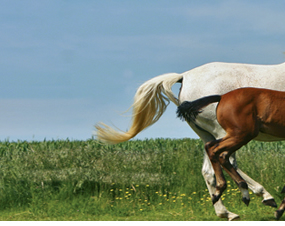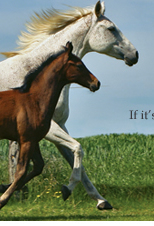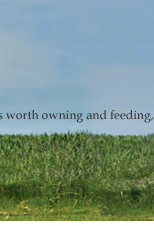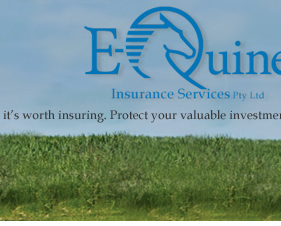



    |
  
|
You are here: Home » Insurance » General Information » Frequently Asked Questions Frequently Asked QuestionsWhat do I need to do to get insurance cover on my horse? You need to make application by completing a proposal form that is provided by a broker or underwriting agent. Very often a proposal form can be downloaded from a website. Otherwise it can be mailed or faxed to you. The proposal form must be accepted by the insurer or underwriting agent acting for the insurer. You need to produce evidence of the insurability of your horse, by obtaining a satisfactory report (veterinary certificate) completed by your veterinarian following a veterinary examination, or for lesser valued horses, by you completing and signing a declaration of good health (health statement). Generally a veterinary certificate is required for all horses aged 13 years and over, for sums insured of $50,000 and over (although this limit varies by insurer), for horses that have had serious prior medical conditions or who, in the previous 12 months, have received veterinary attention other than routine treatments, and for horses purchased at public auction and insured from “fall of hammer”. Once all this information is submitted and accepted, full coverage is granted by the insurer or underwriting agent acting for the insurer. What type of horses can I insure? Insurance can be arranged on a wide variety of horses and equestrian disciplines, with specialist bloodstock insurers. These include thoroughbreds (flatracing, hurdling, breeding, rearing, training, sales preparation), standardbreds, showjumpers, eventers, pleasure/leisure and polo ponies. What value can I insure for? The standard bloodstock policy is limited to current market value, normally advised by you. You may insure for less. In the event of a claim, you will receive the lesser of the current market value or sum insured (also referred to as the limit of underwriters/insurers liability). Averaging provisions or loss sharing provisions do not apply to bloodstock and livestock insurance policies. Do insurers automatically accept my value? The onus is on you to justify the value at the time of a loss or at any time during the duration of the policy. Justification includes the following documentation:
What is the earliest age that I can insure my horse? A newborn foal can be insured at 24 hours after birth, subject to a satisfactory veterinary report, certifying the foal to be in good health. IgG levels are tested and since the outbreak of Equine Influenza (EI), insurers also require blood tests (haemogram). You can insure for the first 24 hours after birth by arranging foetus cover (also known as unborn or prospective foal insurance) that runs from 42 days after last service date until 30 days, 6 months or 12 months after birth. Is my horse ever too old to insure? Most horses are insurable through to 13 years of age without any significant increase in premium rates. Some insurers extend the age limit to 14 even 15 years. Thereafter older (over-aged) horses may be insurable, but the premium cost will increase each year. Moreover, the sum insured will reduce in terms of the over-aged table or scale detailed in the policy document. Like a human being, it pays to arrange life insurance at an early age, because if you attempt to do so in the last few years of your life, you will find it expensive, that’s if you can find someone to insure you. Can I profit from insuring my horse? Generally no, because the object of insurance is to indemnify you in the event of a loss, not to put you in a superior position at the expense of the insurer. In other words, after the claim is paid, you should be in the same financial position as you were immediately prior to sustaining the loss. If I insure the foetus or unborn foal in utero, how is the sum insured determined? Usually the sum insured is a multiple of the service (stud) fee. Some insurers will accept the stallion service (stud) fee while others accept up to twice the service (stud) fee. If you are using a nomination that accrues from a share that you own in the stallion, the advertised service (stud) fee is normally used for determining the sum insured. In this instance in the event of the mare losing her pregnancy or the foal failing to survive the first 24 hours or 30 days after birth (depending on expiry date of policy), the sum insured will be paid as a claim even though you have not actually paid for the use of the service. What circumstances give rise to a claim under a foetus/unborn or prospective foal policy? a) if the mare loses her pregnancy, by abortion or resorption; b) if the foal in utero is born dead or fails to survive the period post birth until the expiry date of the policy; c) if the mare dies during pregnancy (some insurers require the mare to be insured before they will insure the pregnancy). What is the earliest that I can arrange foetus/unborn or prospective foal policy? 42 days after last service date. Some insurers prefer to wait until 45 days. Before accepting cover, insurers require confirmation of scans revealing the existence of a viable single foetus and proof that the mare is positively in foal on the date on which the policy is incepted. How is the sum insured determined for a young foal? Normally insurers agree to twice or three times the stallion service (stud) fee. In some instances it may be higher in line with the estimated market value of the foal at that point in time. How and why do premium rates for horse mortality (death) vary? In essence, the higher the risk, the higher the premium rate. Insurers are similar to bookmakers. Betting odds and premium rates are simply ways of expressing the probability of an event happening. Even money (like heads or tails) translates into 50% probability. A rate of 4% equates with 1 in 25. The period of insurance and use to which a horse is put have a bearing on the premium rate charged. Generally barrenness and foetus/unborn or prospective foal insurance command the highest rates. Next highest would be over-aged horses (14 years and older), followed by foals insured from 24 hours to 29 days after birth. The rate reduces if you wait until 30 days after birth. Young foals are a relatively high risk because often they do not possess the immunity to combat disease or illness. Rates for racehorses (flatracers) are generally lower than foals, although hurdlers and steeplechasers can be about 50% more expensive than flatracers. Stallion and broodmare rates are lower still, while yearlings are the lowest tier because yearlings are not exposed to the rigours and stress of racehorses and are considered to be the lowest risk. Give an example of the uses of horses to which you refer above?
Can I change the sum insured at any time during the period of the insurance policy? Most definitely, either up or down. Whenever an adjustment is made to the sum insured, a pro rata adjustment is made to the premium, without penalties. It is important to regularly monitor the value of your horse so that the sum insured remains in line with current market value. How do I get in contact with a vet who treats horses? You can search the website www.eva.org.au in the Find A Horse Vet search feature. Here you can search for an EVA (Equine Veterinarians Australia) member who treats horses in your area, or for your specific concern. Are all horse vets members of the EVA? No - not all veterinarians who treat horses are members of the EVA. Membership of the EVA is not compulsory. But EVA members do form the bulk of practicing vets within Australia who specialise in the treatment of horses. Are all horse vets similarly qualified? All veterinarians who treat horses have undergone extensive undergraduate level veterinary training. Some veterinarians have completed post graduate qualifications and courses that can make them registered specialists in equine medicine and surgery. Can I get veterinary advice from the EVA?
What benefits can I as a client derive from using E-Quine Insurance Services (E-Quine)? The benefits are many and varied. E-Quine is an independentbroking outfit that does the "running" for you by sourcing quotations from its network of specialist underwriting agencies and brokers, who are supported by the world’s leading bloodstock and livestock insurers. Once you inform us of the type of insurance cover you are seeking, we identify those specialist underwriting agents and brokers who are able to arrange the cover that you are looking for. You simply capture the details of the animal(s) to be insured only once, using our specially designed template accessible via our website, and our system will filter your request and forward it to the respective agents and brokers. A solitarypoint of input saves you time and money. Ifyou hadknowledge of who tocontact and the various policy extensions/endorsements available through negotiation, you could do this yourself, but it requires time, money and specialist knowledge. E-Quine is not contractually obligated to any insurer. Therefore we are not influenced to sell you the insurance product that a supporting insurer expects of an underwriting agent, in terms of an exclusive arrangement. In this instance,by definition, the agent is acting on behalf of the insurer. Similarly, we do not receive extra remuneration from insurers in terms of a profit share or volume bonus arrangements.We act with your best interests in mind - we focus on the client, insurers focus on the risk. E-Quine’s professional and specialist service will not cost you anything. E-Quine aims to restore to bloodstock and livestock insurance the role of a conventional broking outfit that provides you with freedom of choice, in terms ofproduct selection best suited to your needs, a placing broker and an insurer. E-Quine offers a spectrum of expert and professional services to protect your bloodstock & livestock assets, including:
Does E-Quine provide recommendation on which quote I as the client should accept? E-Quine is licensed with the Australian Securities & Investments Commission (ASIC) as an insurance broker, servicing wholesale and retail clients. We hold an Australian Financial Services licence no. 315794. Subject to compliance, we are able to provide financial services and to offer personal and general advice. Refer to Glossary of Terms. Does E-Quine provide advice on the terms of cover that are included in the insurance quote? Over 20 years of experience in the bloodstock insurance industry and appropriate professional qualifications, equips us to comment on the various terms of a policy. An explanation of certain of the terms is contained in the Glossary of Terms. Is E-Quine’s website secure for handling my personal details? We treat your personal details with the utmost privacy. Please refer to our Privacy Policy Statement for a full explanation as to how we handle your personal details. Are underwriting agents/brokers using E-Quine backed by reputable underwriters? The underwriting agents/brokers with whom E-Quine networks, are supported by the world’s leading specialist underwriters, the majority of them based in London, all with a security rating of at least "A". |
|
| E-Quine Insurance Services @ 2020 | |